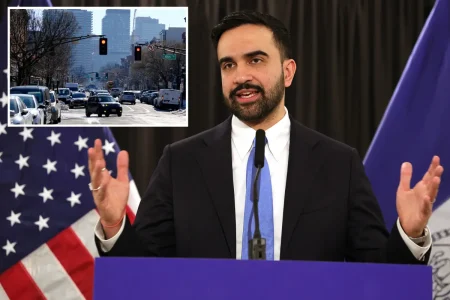Imagine sitting down with a friend over coffee and hearing them say, “Did you hear about that new plan Trump suggested for Gaza?” As surprising as it might sound, former President Donald Trump proposed an idea that experts say breaks fundamental international laws. The plan involves the U.S. taking control of Gaza, relocating all its inhabitants to Egypt and Jordan, and then turning Gaza into what he called the “Riviera of the Middle East.” While this might sound like a wild notion conjured up in passing, the implications, legally and ethically, are far from simple.
### A Major Legal and Ethical Red Flag
To start, forcibly relocating an entire civilian population is not just controversial—it’s illegal under international law. Dr. Janina Dill, co-director of the Oxford Institute for Ethics, Law and Armed Conflict, did not mince words: implementing such a plan would be a straightforward crime against humanity. Forced deportation or population transfer is explicitly outlawed by the Geneva Conventions, and precedents set during the Nuremberg Trials after World War II defined such actions as war crimes. The International Criminal Court’s (ICC) Rome Statute also identifies forced displacement as a crime, with additional charges of persecution if it targets people based on ethnicity, religion, or nationality.
If Trump’s proposal ever moved forward in Gaza, it is notable that the ICC would have jurisdiction. Even though the U.S. isn’t part of the ICC, Palestine is. This would mean that any crimes committed by U.S. citizens within Gaza’s borders could still fall under the court’s purview. International laws have long drawn a line in the sand against forced relocation, and Trump’s plan would clearly step over it.
### Forcing Gaza to Relocate: “They’ll Be Thrilled”?
When asked about the logistics of displacing Gaza’s population, Trump remarked that he would move “all of them.” He even suggested he wouldn’t meet resistance, saying, “I don’t think they’re going to tell me no.” This comment reveals a blatant disregard for the very real agency and self-determination of Gaza’s residents. Beyond this, the sheer scale of such an operation underscores how coercive and forceful it would inevitably be—thus amplifying its illegality.
### Annexation: Violating Foundational International Law
The idea of the U.S. appropriating Gaza itself poses another monumental issue. Marko Milanovic, a professor of international law at the University of Reading, explained that annexing another territory goes against one of the most foundational principles of international law. “You cannot conquer someone else’s territory,” Milanovic stated unequivocally. History has shown that violations of this principle often trigger severe global backlash. For instance, Russia’s annexation of Ukrainian territory led to widespread condemnation and significant international sanctions. Why? Because conquering land undermines sovereignty, disregards political independence, and sets a dangerous precedent that no nation-state wants to normalize.
Even if the matter of Palestine’s statehood (which the United Nations recognizes but the U.S. does not) complicates the specifics of annexation, the act would still violate Palestinians’ inherent right to self-determination. The International Court of Justice has ruled that this right belongs to the Palestinian people in Gaza, further solidifying the legal barriers to any such takeover.
In Milanovic’s own words, “If you take [Gaza] without their consent, you’re violating their right to self-determination. There’s really no doubt about that.”
### A Bigger Problem Than Just One Proposal
What’s most concerning, argues Dr. Dill, is not just the practical impossibility of Trump’s plan but the precedent it sets. Proposals like these casually normalize violations of international law, eroding global standards that have held nations accountable for decades. Trump’s approach demonstrates little regard for international frameworks meant to ensure stability and fairness. His actions—like pulling the U.S. out of the U.N. Human Rights Council and cutting ties with other international institutions—have signaled his distaste for global governance systems. Additionally, this week he signed an executive order to review U.S. participation in the United Nations, further underscoring his skepticism toward multilateralism.
The message, Dill warns, is clear and dangerous: if the U.S.—a world leader—chooses to disregard international rules, why should other countries respect them? This mindset sends ripples far beyond Gaza. Imagine, as Dill pointed out, a future scenario involving a Chinese invasion of Taiwan. If the U.S. itself disregards territorial sovereignty and the right to self-determination in one instance, it undermines its ability to credibly oppose such actions elsewhere.
### A Dangerous World Without Rules
Dill paints a stark vision of where this road could lead. “If we live in a world where conquest is normalized, and the legal rule is simply set aside,” she said, “we live in a completely different world.” And it’s not a safer world—far from it. A world without respect for international laws governing sovereignty and human rights would be chaotic and unstable, with potentially severe consequences not just for smaller, vulnerable nations but even for Americans themselves.
### What’s Next?
Even if Trump’s plan for Gaza does not proceed further, the mere act of proposing it carries serious ramifications. By openly suggesting policies that constitute major international crimes, Trump chips away at the credibility of the international legal system itself. It fosters the idea that these frameworks are optional rather than compulsory, emboldening other leaders around the world to flout the rules.
The stakes are high when it comes to the principles of international law. They’re not just abstract concepts—they’re anchors that bind nations to the ideals of peace, security, and mutual respect. Ignoring or trivializing them creates a culture where might makes right, and smaller nations or populations could be subjected to the whims of more powerful countries.
### Reflecting on the Bigger Picture
Trump’s plan for Gaza is more than a hypothetical proposal. It encapsulates a broader trend of undermining international norms and values. Laws about sovereignty and the humane treatment of populations exist precisely because history has shown us the devastating consequences of ignoring them. From the Lieber Code during the U.S. Civil War to the Geneva Conventions, these rules have evolved over centuries to safeguard human rights and protect against the very kinds of crimes being discussed here.
Discarding these principles in favor of expediency or power would take us backward—not forward—on the moral and legal progress we’ve made. Trump’s Gaza proposal may be just one instance, but it’s a stark reminder of why these guardrails exist in the first place. Ultimately, this is about much more than Gaza—it’s about the kind of world we want to live in. Is it one governed by laws and mutual respect, or one ruled by unilateral actions and disdain for the global community? The answer has implications for us all.









